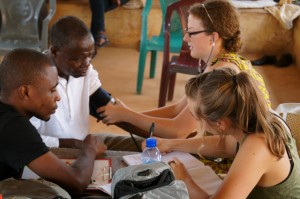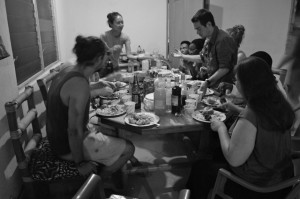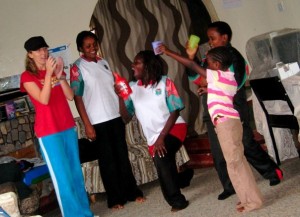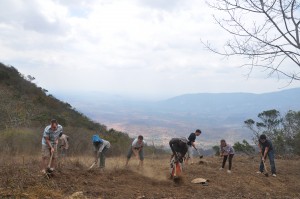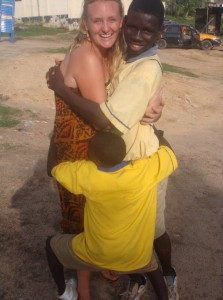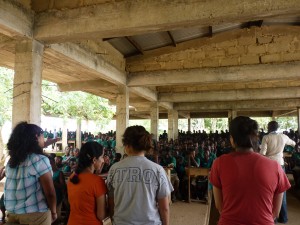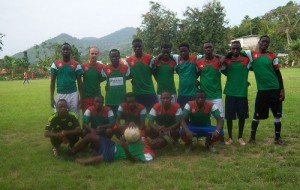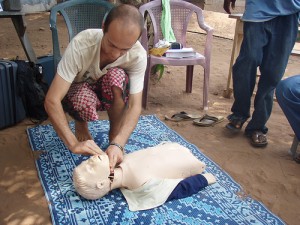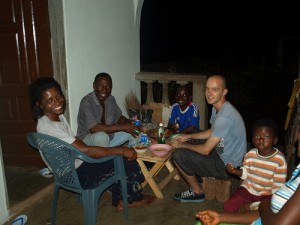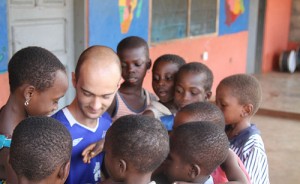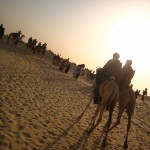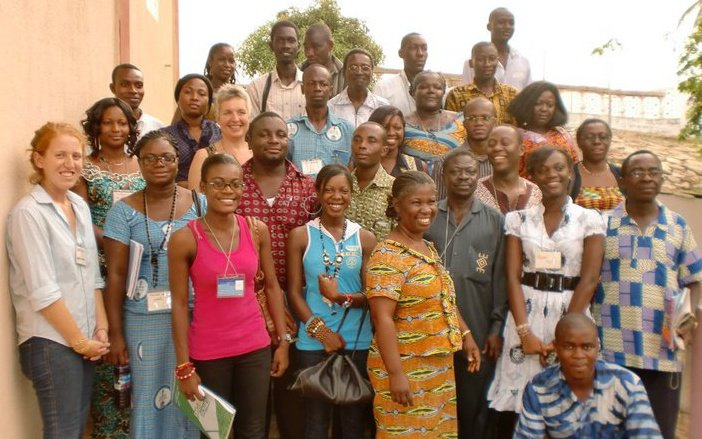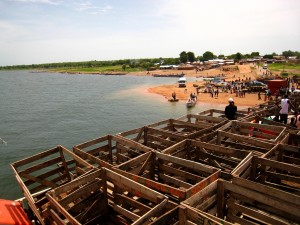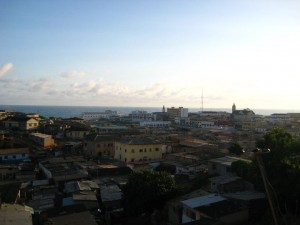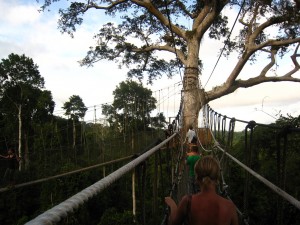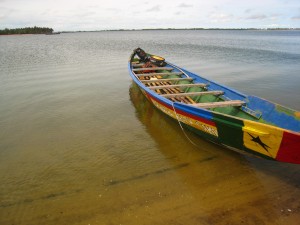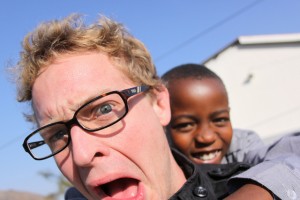
Cameron Price, Peace Corps Swaziland
Name, Age: Cameron P., 26
University: Northern Arizona University
Major: Communications
Type of Work: Medical/Public Health, Education
Region: Africa
Length of stay: 2-3 Years
Tell us about the nonprofit/social business you work for:
I have known that I wanted to apply for the Peace Corps since 2007, and I thought about it hard for several years. It was ultimately a tough decision to come to, as it is a two year commitment, and I would have limited ability to come home. But I made that decision, and spent two years living in rural Swaziland. Those two years were some of the most fulfilling I have ever had, but my third year extension here is proving to give them a run for their money.
I currently am working at Columbia University’s ICAP (International Clinical Support Program) in Mbabane, Swaziland, while donating my free weekends to Baylor International Pediatric AIDS Initiative’s Teen Club Youth Support program. ICAP has been an awesome opportunity for me, and I have seen a lot of Swaziland that I wouldn’t have otherwise. NGOs can be frustrating, but my experience has been great and working on the Clinical and Psychosocial Support programming that we help the Ministry of Health with has been incredibly valuable experience to put under my belt.
To be completely honest though, I stayed for the kids and teens that I have built relationships with at Teen Club. Teen Club is a support group for HIV-positive youth, and currently has something akin to 450 young men and women attending at four different sites. Doing Peace Corps brought me to some of the most beautiful children the world has ever seen, and for that I am so very thankful.
Teen Club: swazilandteenclub.wordpress.com
ICAP: www.columbia-icap.org
How did you find your position?
Applied at peacecorps.gov. Sadly this is only available for US Citizens. I do know that there are awesome organizations like Skillshare… GVI… etc.
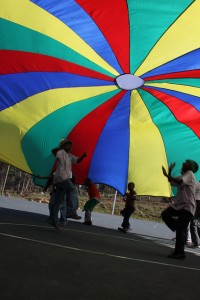
Parachute games at Camp. I got to be Camp photographer, and it was probably one of the best few weeks of my life. I can’t show pictures of the kid’s faces for legal reasons, but this picture always makes me smile.
What’s your typical day like?
I work at a 730-430 desk job now, and it is only OK because I get to do site visits and love rural Swaziland. Lots of paper work.
My weekends, however, I spend with the kids at Teen Club, and that is where I really love my experience.
What kind of people do you work with?
By day I work with some of the nicest office workers ever. By Night I work with chupacabra (pl). On the weekends I work with the most beautiful kids in the world.
Seriously though, NGOs are all pretty highly educated, socially minded people, and I dig them.
What are your living accommodations?
I stay in an apartment near the town center, but for two years I lived in a rondavel. A rondavel is, for those of you who don’t know, it is this: http://en.wikipedia.org/wiki/Rondavel
I often times miss my hut. Oh well.Someday I will build my own.
What do you do in your free time?
Volunteer at Teen Club, hike, travel, read, photography, swimming in Manzini, participate in shenanigans generally.
Share a favorite memory or story from your experience!
The following is excerpted from my blog itsbrilliantanyway.blogspot.com, and was written in August 2010:
How do you explain, on paper, the eccentric, erratic, serendipitous events that make life beautiful?
Writers have been trying to do that for thousands of years, so I don’t even want to begin to tackle that challenge. Frankly, I am just too lazy to try. But still, sitting here, I am faced with the task of writing to you lovely people to tell you what I have been up to.
It can be boiled down to a few catch phrases that I sometimes rattle off when you guys call or are on Skype, like: “The usual,” “Studying,” or “I’m awesome, it’s Avocado season.” Or I could relate a few quirks of life here… like the stuff I put on my Facebook status updates; e.g. “A chicken in a bag bit me on a khombi,” “I almost physically ran into the director of NERCHA with an armful of Hoola Hoops while carrying things into his building,” or the ever popular “I have a handlebar moustache.” But that wouldn’t really get anything valuable across… besides the fact that I am awesome at talking without actually saying anything at all. Which I am.
So why don’t I tell you guys a story. A story about Camp. I just got back from camp, you see, and it was truly the highlight of my service so far. I mean that in much the same way that Optimus Prime would say, “Defeating the Decepticons was the highlight of my service so far.” OK, he would probably never say that, but you know what I mean: Camp changed the way I see the world… and here’s how.
We ran the camp for two five-day sessions, with about 100 kids in all. It was sponsored by NERCHA, BIPAI, Young Heroes, and the Association of Hole in the Wall Camps. All of the kids were HIV-positive, were initiated on ARVs, and knew about their statuses. They ranged in age from 10 to 16, the older kids mostly coming in the first week, and they were all g-d-awesome.
The difference between when the kids came in, and when the kids left was breathtaking. It was simply the most amazing thing I have ever seen happened over the course of five days; they metamorphosed into something new completely. When they showed up, nervous, anxious, and probably homesick, they seldom smiled and didn’t know what was in store. I’m pretty sure a few were afraid of me as I was wearing a strange hat… also I have strange, pale skin. Anyways, after five days of games, songs, scavenger hunts, skits, and praise, they’d all been changed. By the time they left, even the shy kids were giving us hugs, high-fiving their new friends, and saying fond farewells to us all.
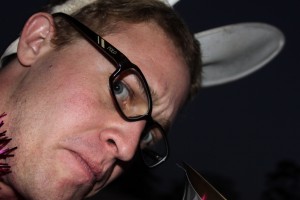
Cameron with Bunny Ears
But the magic of camp wasn’t just for them. Over the last six months I have been getting used to the idea of everyone now knowing I have a polyplural neuropathy called Charcot Marie Tooth. It’s a hereditary disease passed down from my dad’s side of the family, and will most likely limit my mobility someday. It slowly lessens my body’s ability to conduct electrical impulses to my limbs, and will lead to weakness and possibly chronic pain. I had been aware that I might have it for some time now, but it’s different when it’s on paper. Part of it is knowing that other people know. It’s one thing to feel broken all the time and keep it a secret, it’s another thing entirely for everyone to be on the know with you
Here’s the thing, and it’s something I go back and forth between feeling like an a-hole about and feeling blessed because of. These kids all have a disease that will cost them their lives, most likely in the next few years, and they never should have been exposed in the first place. Just because Swaziland didn’t get (and still sometimes doesn’t have) the medications and professionals to prevent it, these kids and a few thousand more won’t have a shot at being normal kids. I spent my 25th birthday asking myself what the f*ck I did to deserve this disease instead of a case of Pediatric HIV. It was a crap shoot and, even though I spent all this time thinking I was S.O.L., I am so shamefully lucky. I feel like a major cock for writing this down, but those kids fixed me. I think I got more out of camp than they did. Seeing them smile and beat me at soccer games did more for me than they will ever know: They just had a good time at camp… I figured out what I want to do with my life.
I may have a hereditary disease, but that’s OK. I’m going to spend the rest of my life trying to make kids like the ones I met at camp smile. I want to make them feel better, because when they feel better, I feel a little less broken inside. Ugh… and I still can’t properly construe what this means to me, probably won’t ever be able to. I want to live every single day like I am still at camp
… guess that’s the most important thing I learned there.
Anyways, seeing kids smile… isn’t it just the most beautiful thing that you have ever seen?
Best Wishes from Swaziland,
Cameron Price
PCV Group 7
Define yo’ terms!
NERCHA – National Emergency Response Council on HIV and AIDS
Young Heroes – An NGO that sponsors AIDS orphans with regards to school fees in SD
BIPAI – Baylor International Pediatric AIDS Initiative. Baylor Pediatric Clinic in Mbabane is amazing. They distribute meds, do testing events, reimburse for travel, and operate Teen Club Support groups in three regions of Swaziland… soon this will expand to all four. Also the Baylor docs are always incredibly cool, quick to give you straight answers, and sometimes even rides in cars. Hats of to you guys. Especially Doug. You deserve a Sivivane Kilo!
Association of Hole in the Wall Camps – Founded by Paul Newman, actor and Philanthropist (RIP), Hole in the Wall operates camps in countries around the world, specifically aimed at giving kids with chronic or terminal diseases a shot at a fun childhood. Their rep was awesome and totally is the reason our camp was a success… thanks Babe Jazz.
What inspired you to do this kind of work? If you are taking a gap year, what motivated you to do that?
I was born here http://en.wikipedia.org/wiki/Arizona and – though I still love it – I needed to get the hell out. I have wanderlust, and these roads aren’t going to walk THEMSELVES, now are they? I met a returned Peace Corps Volunteer, heard about her experiences in Nepal, and I knew I had to apply.
Going abroad is the best way to learn about where you are from. I never knew America until I left it and saw it through the eyes of others. I also was fortunate enough to meet some spectacular people along the way.
How are you financing your time?
Peace Corps pays my stipend monthly, and my NGO picks up the costs of housing.
What kind of special skills do you need to do your job?
Language, Medical expertise
Do you feel like you are making a positive, critical impact on the global community?
Yes. Absolutely. I have made friends for life. No matter how unimportant my filed forms are, I will always have another (Swazi) family.
What have you learned about the nonprofit and social business world in your experience?
That one must be careful of where one donates money; that people can do a lot of good and that the world will work out OK if you put some time into it.
Do you think you make a unique contribution to your organization as a young person? Is your perspective or approach different from others?
Yes. My 2 years in rural Swaziland allowed me insight into how Swazis live, that town-folk don’t always get. My age makes me relevant with certain things, and have abilities that some older people might not be aware of.
How do you see this experience fitting into your long-term goals?
I spent two years working on HIV projects in Swaziland, the country with the highest HIV prevalence and incidence rates. I want to go to Medical School so I can come back and make sure those numbers go down.
What’s next?
Medical School. Hopefully. And as for volunteering, I will always do it in any way I can.
What is one thing you wish you knew before you came to your position?
You can never be TOO open.
Do you have any advice for prospective gap-givers?
DO IT. If you don’t you will end up asking yourself, “What If?”
Are you blogging about your work or travel? How can we stay in touch?
yes, but you need an invited to read it. PC is strict about what gets published. Email me questions at brilliantanyway@gmail.com and I will furnish you with answers ASAP.
Cheers!
Would you be willing to take questions from potential Gappers?
Yes
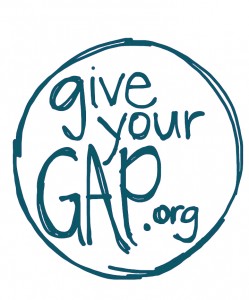
 This week’s feature was written by Kristine Sloan, who currently serves as the Director of Operations for ACIPP West Africa.
This week’s feature was written by Kristine Sloan, who currently serves as the Director of Operations for ACIPP West Africa.
